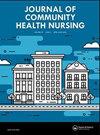Evaluating the Effectiveness of Using the Teach-Back Method to Improve the Health Literacy of Individuals in the Community.
IF 0.9
4区 医学
Q4 NURSING
引用次数: 0
Abstract
PURPOSE The purpose was to evaluate the effectiveness of the teach-back method in improving communication between registered nurses and people receiving healthcare services in a community-based setting to address the issue of low health literacy. DESIGN A quasi-experimental study, pre- and post-test design with an intervention group and a comparison group was conducted to study the teach-back method and the quality of communication between registered nurses and people receiving healthcare services in a community-based setting. METHODS For the intervention group, the registered nurses integrated the teach-back method into the delivery of healthcare services to enhance communication with people who received services at various community-based sites. The comparison group received healthcare services at various community-based sites, without the teach-back method. A retrospective pre- and post-test questionnaire was administered to the participants in the study to measure communication with registered nurses. FINDINGS The post-test mean score (M = 5.58, SD = .743) of the intervention group was significantly higher than their mean pre-test score (M = 5.17, SD = 1.195), t(434) = -7.727, p < .001, Cohen's d = .371. The difference between the pre- and post-test mean scores of the comparison group was not statistically significant. CONCLUSIONS The findings confirmed the effectiveness of the teach-back method for improving patient communication among people receiving healthcare services in a community-based setting. CLINICAL EVIDENCE Community health nurses can utilize the teach-back method while delivering healthcare services to improve patient communication and address health literacy among people in the community.评估使用回授法提高社区个人健康素养的效果。
目的评估回授法在改善社区注册护士与接受医疗服务者之间的沟通方面的效果,以解决低健康素养问题。方法对于干预组,注册护士在提供医疗保健服务时融入回授法,以加强与在不同社区站点接受服务者的沟通。对比组在不同的社区站点接受医疗保健服务,但不使用回授法。研究结果干预组的后测平均分(M = 5.58,SD = .743)显著高于前测平均分(M = 5.17,SD = 1.195),t(434) = -7.727,p < .001,Cohen's d = .371。结论研究结果证实了回授法在改善社区医疗保健服务对象的患者沟通方面的有效性。
本文章由计算机程序翻译,如有差异,请以英文原文为准。
求助全文
约1分钟内获得全文
求助全文
来源期刊
CiteScore
1.40
自引率
10.00%
发文量
21
审稿时长
3 months
期刊介绍:
This innovative publication focuses on health care issues relevant to all aspects of community practice -- home health care, visiting nursing services, clinics, hospices, education, and public health administration. Well-researched articles provide practical and up-to-date information to aid the nurse who must frequently make decisions and solve problems without the back-up support systems available in the hospital. The journal is a forum for community health professionals to share their experience and expertise with others in the field.

 求助内容:
求助内容: 应助结果提醒方式:
应助结果提醒方式:


